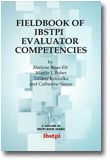
Fieldbook of ibstpi Evaluator Competencies
By:
Darlene F. Russ-Eft, Oregon State University
Marcie J. Bober-Michel, San Diego State University
Tiffany A. Koszalka, Syracuse University
Catherine M. Sleezer, Training and Performance Improvement Specialists
A volume in the series: The IBSTPI Book Series. Editor(s):
Published 2014
The book, Evaluator Competencies: Standards for the Practice of Evaluation, details the development and validation of evaluator competencies by the International Board of Standards for Training, Performance, and Instruction (ibstpi). Developing an understanding of the ibstpi Evaluator Competencies may not be sufficient for individuals to determine how to improve their, or their colleagues', competencies. This Fieldbook provides additional information, resources, and tools to assist those who want to improve their own competencies or those who want to help other individuals improve. Thus, the goals for the present companion volume are:
• To provide additional practical information in each of the four evaluator domains (i.e., professional foundations, planning and designing the evaluation, implementing the evaluation plan, and managing the evaluation).
• To present practical tools and resources that support specific evaluator competencies, whether as an internal or an external evaluator.
• To offer practical insights on the evaluator competencies from experienced evaluators.
• To provide practical evaluation exercises and resources that can be used with undergraduate and graduate courses.
CONTENTS
Overview and Purpose. DOMAIN: PROFESSIONAL FOUNDATIONS. 1. Communicate Effectively in Written, Oral, and Visual Form. 2. Choosing an Evaluator. 3. Demonstrate Effective Interpersonal Skills. 4. Observe Ethical and Legal Standards. 5. Demonstrate an Awareness of the Politics of Evaluation. DOMAIN: PLANNING AND DESIGNING THE EVALUATION. 6. Develop an Effective Evaluation Plan. 7. Develop a Management Plan for the Evaluation. 8. Devise Data Collection Strategies to Support the Evaluation Questions and Design. 9. Pilot Test the Data Collection Instruments and Procedures. DOMAIN: IMPLEMENTING THE EVALUATION PLAN. 10. Collect Data. 11. Analyze and Interpret Data. 12. Disseminate and Follow Up the Findings and Recommendations. DOMAIN: MANAGING THE EVALUATION. 13. Monitor the Evaluation Plan. 14. Work Effectively With Personnel and Stakeholders. About the Authors.
-
Paperback9781623964429
Web price: $45.04 (Reg. 52.99)
-
Hardcover9781623964436
Web price: $80.74 (Reg. 94.99)
- eBook9781623964443

- EDU037000 - EDUCATION: Research
- EDU007000 - EDUCATION: Curricula
- BUS030000 - BUSINESS & ECONOMICS: Human Resources & Personnel Management
-
 (Re)Envisioning Social Studies Education Research
Current Epistemological and Methodological Expansions, Deconstructions, and Creations
(Re)Envisioning Social Studies Education Research
Current Epistemological and Methodological Expansions, Deconstructions, and Creations
-
 Frameworks for Integrated Project-Based Instruction in STEM Disciplines
Frameworks for Integrated Project-Based Instruction in STEM Disciplines
-
 Instructional Designer Competencies
The Standards (Fourth Edition)
Instructional Designer Competencies
The Standards (Fourth Edition)
-
 Instructor Competencies
The Standards, Fourth Edition
Instructor Competencies
The Standards, Fourth Edition
-
 Online Learner Competencies
Knowledge, Skills, and Attitudes for Successful Learning in Online Settings
Online Learner Competencies
Knowledge, Skills, and Attitudes for Successful Learning in Online Settings
-
 Qualitative Research With Diverse and Underserved Communities
Qualitative Research With Diverse and Underserved Communities
-
 Reflections on People, Policy, and Practices in Curriculum History
Reflections on People, Policy, and Practices in Curriculum History

